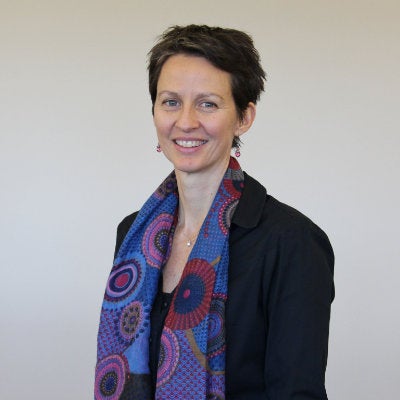- Professor of French; Director Honors Program
- Phone: 401.874.4697
- Email: debruin@uri.edu
- Office Location: Lippett Hall
Biography
As both a humanist and a believer in the importance of language for the professions, Dr. de Bruin has implemented a vision for the Department of Modern & Classical Languages & Literatures that articulates explicitly what programs in the department were already doing informally: leading students to greater humanistic understanding while granting language credentials and providing international professional experiences that students can use immediately upon graduation. As part of this vision, Dr. de Bruin set forth and is leading the department to realize three strategic priorities for the Department of Modern & Classical Languages & Literatures: 1) implement proficiency-based pedagogies, benchmarking and assessment across all language programs; 2) implement intercultural competence-based pedagogies, benchmarking, assessment across all language programs; 3) unify, strengthen and expand our international professional programs.
When she is not “chairing,” Dr. de Bruin is teaching French, building international partnerships, creating new academic programs, studying French Huguenot winemakers in South Africa or engaging in a diverse array of public humanities projects. Either that or working on her latest doodle.
Teaching
Experimental by nature, Dr. de Bruin is always looking for new ways to innovate in her teaching of French. Whether through the incorporation of visiting artists, video-conferencing with Masters students at the Université de Rennes 2 or the creation of a health sciences J-term travel course to France, she continues to seek new, meanigful ways of engaging her students with the French language and French and Francophone cultures.
Program Development
Building programs is in Dr. de Bruin’s blood. She is the founder and director of the URI-Université de Rennes consortium exchanges (Université de Rennes 1, Université de Rennes 2 and the Institut d’études politiques) and the URI-Mod’Spé fashion marketing and merchandising exchange. She is also the co-founder and co-coordinator of the International Studies & Diplomacy program.
Research
Originally from South Africa, Dr. de Bruin has always been interested in questions related to slavery, race, colonization and revolution. She began as a dix-huitièmiste who specialized in the aesthetics and politics of Germaine de Staël, an abolitionist and activist during the French Revolution. Her work now focuses on the ties between France and the Cape Colony (South Africa) in the 18th century, and specifically on questions related to commerce, memorialization and the construction of white superiority.
As a self-identified humanist activist, Dr. de Bruin has worked on a number of public humanities projects including the study and memorialization of the slave trade in the state of Rhode Island, the promotion of the theatre of contemporary French playwright Jean-René Lemoine, and the Beauty Salon, a radio show on “all things aesthetic in the state of Rhode Island.”
Selected Publications
“From Viticulture to Commemoration: French Huguenot Memory in the Cape Colony (1688-1824).” Under review.
“Grassroots Memorialization and the Slave Trade: The Public Humanist as Knowledge-Broker.” Under review.
“An Eighteenth-Century Call to be Heeded Today: On Germaine de Staël, Aesthetic Education and National Progress.” The Journal of Aesthetic Education. Volume 49:1, Summer 2015, 82-97.
“A Meaningful French Education: Experiential Learning in French.” (Co-Authored with Lars Erickson and JoAnn Hammadou-Sullivan.) The French Review. Volume 87.3, Spring 2014.
“The Melancholy of Happiness: The femme supérieure in Corinne.” Sensibility, Society and the Sisters Arts: Germaine de Staël’s Historical Revisionism. Ed. Karyna Szmurlo and Tili Boon Cuillé. Bucknell UP, 2013. 125-152.
“Romantic Aesthetics and Abolitionist Activism: African Beauty in Germaine de Staël’s Mirza, lettre d’un voyageur.” Symposium: A Quarterly Journal in Modern Literatures. Volume 67:3, Fall 2013, 135-47.

